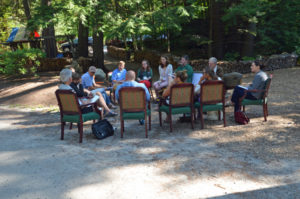A Maine Summer Camps Post-Season Workshop: Giving Directors the Opportunity to Network and Connect
For camp directors, the summer season is a 24/7 focus exclusively on their camps and campers. But on September 13, at Migis Lodge in Casco, those directors got a chance to take a breath, reflect on their summers, and exchange ideas with each other. The annual Maine Summer Camps Fall Workshop brought together 80 camp personnel from more than 40 Maine camps. They networked, shared experiences, and enjoyed the chance to connect in six different workshops organized by the Maine Summer Camps Education Committee. A waterfront cookout capped off the morning.

Directors Attend Workshops Facilitated by the Education Committee
The workshops, each facilitated by an Education Committee member, included: technology; campers and parents; staff; inspections and accreditation; health; and sex, sexuality and gender. Participants had the chance to rotate through three different workshops, giving them ample opportunity to share ideas and experiences, raise common concerns, and suggest solutions.
“It was an opportunity to learn from each other in an open conversation,” said Education Committee Chair Beigette Gill. Each camp is individual and unique, Gill said, making conversations about issues and concerns particularly valuable.
Directors Examined Questions That Affect The Entire Industry
Although summer camps they may be physically isolated in areas of Maine’s natural beauty, they represent an industry. Camp directors at Wednesday’s gathering examined questions that affect their business practices – like regulatory inspections and technology – and contemplated issues like camper retention, providing healthcare, and sexuality and gender.
Retention Is An Issue That All The Camps Have In Common
One issue that camp directors continually face is how to retain campers in a changing world. Kids are drawn to a broad range of summer activities, including academic and travel programs, sports specialty camps, and family vacations. Discussions about camper retention raised a broad range of ideas, including offering specialized programs, providing flexibility to campers who need to leave camp for tournaments or other commitments, and creating new programming, such as leadership or community service opportunities.

Technology Is A Consideration For Staff
Camps also face issues regarding technology. Many camps promote a tech-free experience for their campers, but still must confront concerns regarding kids’ attachment to technology and screen-time. And just because camps like to keep kids unplugged, they still rely on the latest advances in technology to run their businesses. That means using web-based tools for staff training, website considerations, and parent communications. And just as campers are hooked on their devices, staff are, too. Camps must consider how to best manage staff screen time and cell phone access.
Camps Discussed The Benefits Of Having a Trained EMT On Staff
Campers also get sick. Directors discussed how they staff their health centers, as well as how they access medical care off-site. Many camps have relationships with healthcare providers in their areas, but directors said it is more difficult to obtain same-day appointments. One camp director said they now separate orthopedic injuries from primary care health issues as a means of facilitating off-site treatment for campers. Camps also discussed the benefits of having trained EMTs on their staffs. And campers and staff sometimes come to camp with mental health care issues, directors said. This demands additional versatility on the part of healthcare staff, they said.
Camps Are Inspected On A Regular Basis
Camps are also subject to regulations, including regular inspections from the state Department of Health and Human Services. In addition, the American Camp Association accredits many Maine camps and make regular visits for that process. Despite the stress of being evaluated, camp directors said inspections this summer went smoothly and that they had positive interactions with inspectors. Camps also benefit from their Maine Summer Camps membership, which provides resources about camp inspection reports and Maine regulations.
Directors Shared Resources On The Issues of Sex, Sexuality and Gender
Additionally, Wednesday’s gathering gave camp directors a chance to discuss issues of sex, sexuality and gender. Many Maine camps have passed their century mark, yet they are part of a changing world. Directors observed that youngsters are talking about sex at a younger age, and that staff need to be equipped to manage such conversations. Directors also talked about appropriate conversations for the camp environment. They suggested that one standard to follow is that it is OK to talk about what you are but not what you do. Another issue to consider is the emergence of transgender staff and campers. Camps in Maine include individuals who identify as transgender, and directors tend to heed the practice of sharing gender status only with key individuals, such as nurses and key staff. Participants in the conversation raised the question of nudity and privacy, and drew the conclusion that campers tend to be quite modest, and a transgender staff member or camper would also have that mindset. Directors also shared resources that are helpful on this subject, including two books, Transgender 101 and The Transgender Child.

Maine Summer Camps Offers A Broad Range Of Resources
Camp is over for the summer. Campers and staff have returned home, camp personnel are limited to year-round staff, cabins and tents are empty, and instructional space has been closed up. But camp directors are already thinking about next summer, by evaluating the 2017 season and networking with others in the industry. Maine Summer Camps, the non-profit membership organization serving Maine camps, offers camps a broad range of resources. The Fall Workshop was just one event designed to bring together camp personnel so they can continue their singular goal: a mission-driven effort to benefit kids.